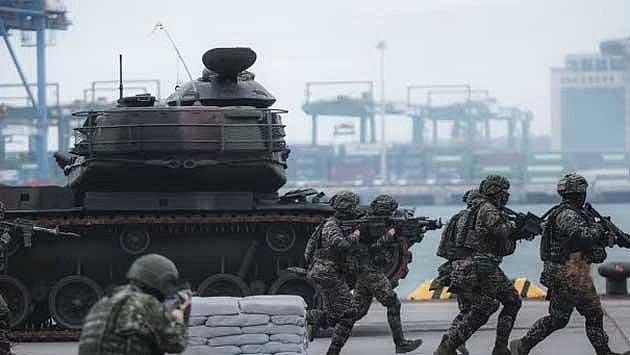 |
Japan has asserted its intention to counter Chinese military aggression, signaling a tougher stance on regional security matters. This shift in policy comes as no surprise given the increasing incursions by Chinese naval vessels, aircraft, and spy planes into Japanese territory, which Tokyo deems a severe threat to its sovereignty.
The Japanese government, led by Chief Cabinet Secretary Yoshimasa Hayashi, recognizes the urgency of addressing China’s military trends. In a statement, Hayashi conveyed a strong sense of crisis regarding China’s series of incursions into Japanese airspace and territorial waters. Japan is committed to taking all necessary measures to safeguard its interests and contribute to regional stability.
This assertive approach aligns with the broader international support for ‘freedom of navigation’ and a rules-based international order. Bec Strating, an international relations expert, observes that Japan’s actions are consistent with a growing trend among nations, particularly in Asia, to challenge China’s maritime claims by increasing their naval presence.
While Chinese President Xi Jinping extended congratulations to Japan’s new leadership and advocated for peaceful coexistence, tensions persist. Japan remains cautious of China’s intentions, especially given the ongoing disputes over Taiwan, an issue that Beijing considers a “red line.” The election of the new Japanese leadership, with its defense-focused agenda, has prompted Beijing to express its “heightened vigilance,” signaling a potential shift in Sino-Japanese dynamics.
Taiwan continues to be a contentious issue, with Ishiba’s visit to the island in August drawing strong criticism from Beijing. Despite some Chinese state-run media portraying his policies as more balanced, China closely monitors Ishiba’s every move. Ishiba, a former defense minister, is a strong advocate for a robust Japanese military, and his influence is expected to shape Japan’s security strategies in the years to come.
Additionally, Ishiba has proposed the formation of an ‘Asia NATO’ to counterbalance China’s growing influence in the region. He draws parallels between the situation in Asia and the conflict in Ukraine, emphasizing the absence of a collective defense system like NATO in Asia, which could lead to heightened tensions and potential conflicts.
Misato Matsuoka, an associate professor at Teikyo University, cautions that the escalating actions on both sides “risk heightening military tensions in the region.” As Sino-Japanese relations become more strained, the path toward a peaceful resolution becomes increasingly challenging, necessitating careful diplomacy and strategic decision-making.
The Philippine Conundrum: When Helicopters Shadow Aircraft
The Philippines fisheries bureau aircraft was tailed by a Chinese navy helicopter during a routine patrol near the contested Scarborough Shoal. In a tense stand-off, the Chinese helicopter closely approached the Philippine aircraft, highlighting the ongoing territorial dispute between the two nations. This incident once again brings to light the bitter row over territory, with both countries asserting their claims in the region.
Minamino’s Magic: A Clinical Display as Japan Thrash China
Japan kicked off the third phase of the Asian qualifiers for the 2026 World Cup in style, with a commanding 7-0 victory over China at the Saitama Stadium on Thursday. The hosts put on a dazzling display, showcasing their credentials as a force to be reckoned with in the continent’s preliminary rounds.
The Elusive Adversary: Unraveling New Zealand’s Annual Intelligence Report
In an unprecedented move, New Zealand has released a report through the New Zealand Security Intelligence Service (NZSIS) that signals a shift in its traditionally neutral diplomatic stance. The report shines a spotlight on the increasing dangers of foreign interference, with a particular focus on China, and serves as an eye-opener for a country that has, until now, been largely insulated due to its remote location.
Vietnam’s Pristine Park: Cuc Phuong’s Prestige as Asia’s Top National Park in 2024
Vietnam News Headlines Today (September 4): Top Vietnamese Leader Holds Virtual Meeting with Japanese Prime Minister; Cuc Phuong National Park Bags the Title of Asia’s Leading National Park for 2024; Chinese Airline Selects Hanoi as Its First International Destination; Guinean President Umaro Sissoco Embaló Pays an Official Visit to Vietnam This Week.








